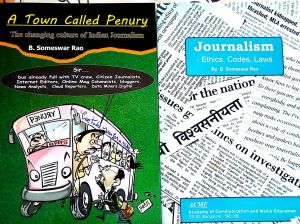DEMOCRACY IN ACTION

The argument mentioned in the post yesterday, that MPs and MLAs should be give higher emoluments to prevent poverty driving them to corruption, suffers from one weekness: Crime or corruption arise not from poverty but from the values and mentality of those involved and not from their need.
Eduction is expected to teach us the difference between want and need. It has been seen that those who have much want some more. Those who steal out of need are much fewer than those who do so out of greed – wanting more things.
In childhood I was told of a writing competition in a college:”What will you do if you have a lakh of rupees?”(Those days that was a huge sum). Most students wrote of things they would buy for those they love or fufilling their dreams. The prize winner wrote that he would tighten his belt, eat and spend less so that he could turn that one lakh into two. Having a big amount makes you realise what you can do with it –and with much more.
Ministers who collect 10 per cent as bribe from contractors don’t do it due to hunger. If need was the cause those raided and found having disproportionate weath would not have been in possession of several hundred crores of rupees.Had they taken just to meet needs, they would not have been suspected in the first place.
If some MPs ‘cashed’ their positions and grew rich, it was not because of poverty. Similarly if some MPs just sign the register and never participate, it is only because the party leaders want such members – only to given them the numerical majority which is all that matters in a ’51-is-right-49-is-wrong’ democracy. Such ‘dumb’ members do not threaten their leadership by developing ambitions.
In the pre-Emergency Parliament there was a debate on the ‘Pondicherry Licence Scandal’ where a minster, L.N.Mishra from Bihar, was charged with issuing a licence to one Tulsian for import of stainless steel. A CBI investigation showed the licence was issued on the basis of letters by some MPs recommending it. Their signatures were allegedly forged.
The MPs had to state in the house that CBI officers visited them and showed the letters. Their signaturesnot genuine and were forged. The MPs, including a woman, were hardly ever seenin the House before. They had never spoken. They were given the statement, in Hindi, to read out.
The problem in Hindi is that a verb has a gender. A male would say ‘tha’ and a female ‘thi’ for ‘was’. A male MP took the statement from a woman MP and read it out, saying ‘thi’ n plce of ‘tha’, resulting in laughter in the house. The members were not only inactive but also barely literate and could not understand the difference. Their only duty was to say ‘Aye’ in voting whenever their leader wanted, or table the questions given by him.
This is not to disrespecr illiterate members. A Jana Sangh (now BJP) member in 1970s was a ralway coolie earlier and learnt to fread and write from a journalist friend of mine. But he was one of the most active MPs. And highly ‘educated’ members blindly supporta barely educated and dumb ‘leaders’ just because they belong to a dynasty.
Not all the members are illiterate. An actor, playback singer or crciketer is chosen by the ruling party not for their valuable contribution to debates or ideas but as a reward for using their glamour to attract crowds in election campaigns and for the value added to the party by nominating them. As they earn much more than the Rs 2000-a-day sitting allowance they attend only the minimum number of days to retain their membership.
And attendance here means going to parliament house to sign the register – and perhaps sit in the allotted seat for a minute or two. This practice is not limited to the Congress, though it did so more often than others. ‘Maharani’ Gayatri Devi of Rajasthan, said to be one of the most beautiful womenof her times. was a Swatantra Party MP. I saw her sit the Lok Sabha for some minutes before leaving. And that ‘attendance’ too was rare.
Some MPs are seen mostly in the Central Hall, which is just a huge coffee house where all the lobbying and political bargaining takes place. Their views, experience or advice do not matter. They have to only sign where they were asked to and contribute to the numbers.
And their leaders want them paid more for it.
